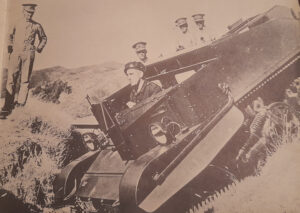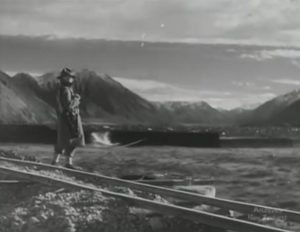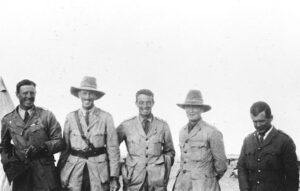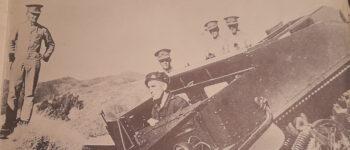1938: The Affair Of The Four Colonels
May 18, 2022
By AHNZ
 New Zealand, in 1938, did not have a modern army and we were not ready for the new form of warfare that was coming. Labour 1.0 came to power as a Victimhood Culture Government in 1935 and then presided over a Slave Culture era. Many of the Ministers had been imprisoned as Conscientious Objectors during WW1 including, for example, Minister of Police Peter Fraser. Ref. 1916: Peter Fraser Incarcerated, AHNZ
New Zealand, in 1938, did not have a modern army and we were not ready for the new form of warfare that was coming. Labour 1.0 came to power as a Victimhood Culture Government in 1935 and then presided over a Slave Culture era. Many of the Ministers had been imprisoned as Conscientious Objectors during WW1 including, for example, Minister of Police Peter Fraser. Ref. 1916: Peter Fraser Incarcerated, AHNZ
Labour 1.0 picked as Minister of Defence a man whose work experience consisted of 21 years of cutting out shapes for another fellow to make shoes from: Fred Jones, apart from this, was a unionist politician and along with his Conchie colleagues did little to inspire confidence in Kiwis that their nation was in safe hands.
A time of High Honour Culture was now upon the world and in order to be re-elected in the election year of 1938 Labour needed to show that it could make that transition. Hitler’s Honour Culture Germany had annexed Slave Culture Austria in March simply by walking in and taking over earlier in the year. The Spanish Civil War had been demonstrating what modern warfare looked like, especially on the part of Germany and Italy who were using the opportunity to feel their Honour Culture muscles growing. Japan, also in HC, were doing the same in China. New Zealand, like Britain, were degrees behind still lingering in Slave Culture while the rest of the world grew teeth.
For example, even on 30 September 1938 the Slave Culture British Prime Minister Neville Chamberlain was waggling a bit of paper around crying “peace in our time.” It would not be until May 1940 that Dignity Culture Chancellor Adolf Hitler was offered a counter in the Honour Culture Prime Minister Winston Churchill. New Zealand, a cultural colony of Britain, had a hard time shifting into Honour Culture mode and recognising the Axis Powers as enemy until Churchill helped everyone get the point. In 1934 George Bernard Shaw visited to tell us how great Mussolini, Hitler, and Stalin were as an example for us to follow. In late 1936 our un-serious Slave Culture King Edward flaked out and quit his post, abdicating in his Empire’s time of growing need to pursue his love interest.
 Labour, in 1938, had not prepared New Zealand for war at all. Their big plan, if any, was that the British Navy’s stronghold at Singapore would extend its protective power over us and therefore we should kick back, relax, and let Savage and his government socialise and nationalise everything. Fall of Singapore to the Japanese in February 1942 shocked New Zealander out of any of its remaining Slave Culture complacency.
Labour, in 1938, had not prepared New Zealand for war at all. Their big plan, if any, was that the British Navy’s stronghold at Singapore would extend its protective power over us and therefore we should kick back, relax, and let Savage and his government socialise and nationalise everything. Fall of Singapore to the Japanese in February 1942 shocked New Zealander out of any of its remaining Slave Culture complacency.
Some tokenistic things had been done by Labour. The previous year, 1937, Army Schools of Instruction had been set up in the defence command districts. In April, 1938, the Army became motorised instead of relying upon horses. New Zealand added 6 imported Bren Carriers (ref image above) to their pool from 7 March. Yet, these extra lessons and toy purchases were easy things for Labour 1.0 to do and quite possibly made them a bit of payola on the side. They still were not taking the defence of New Zealand seriously. This was pointed out early in 1939 by a visiting British Major-General who referred to the training schools as ‘paper schemes’ and no comparison to commanding troops in the field.
“Major-General Piers Mackesy, a British Army officer who had conducted a tour of inspection of New Zealand early that year, reported that Territorial officers were frustrated at the limited response to the situation,…while acknowledging the valuable training provided to the Territorial officers and other ranks by the Army and District Schools of Instruction, he argued that such training were only ‘paper schemes’ compared to training within regular units, and that a lack of a regular force had proved detrimental in preparing both regular and Territorial officers for combat roles: “No regular officer in New Zealand ever, throughout his service, in peace, gets any opportunity at all to exercise tactical command, except when attached to a unit abroad. Neither as a young subaltern nor as a senior officer, does he ever command any of his troops in the field.”” – Stack (2014)
“The Army entered a new era by mounting a wholly-motorised exercise on a trek from Palmerston North to Napier…the large number of army horses based in Palmerston North would be reduced to just six “for packing purposes.” – New Zealand Year by Year in the Twentieth Century, Jim Sullivan (1999)
“However, there were still some serious concerns from senior officers within the Territorial Force regarding the ability of the military forces available to defend the country. In 1938 four Territorial brigade commanders (Colonels C.R Spragg, N.L Macky, A.S. Wilder and R.F. Gambrill) issued a written public statement that challenged government assurances that the Territorial Force was sufficient in size and well enough trained to protect the Dominion. They claimed that morale was low, that the force was inefficient and that successive governments had not encouraged voluntary enlistment. This proved a great public embarrassment to the government..” – Stack (2014)
“The Minister at Dargaville admitted that although 9,000 are wanted only 7,400 are enrolled, and of these only 41 per cent have attended camp this year.” – Auckland Star; Stack (2014)

New Zealand’s leadership under Labour might very well have led to our conquest at the hands, probably, of the Japanese. In hindsight it is obvious that World War Two was going to be big and serious but we didn’t know that then. Our politicians were being told but they were not listening. As we see, New Zealand was so unprepared that we were still running on horses in mid-1938!
The Colonels’ Revolt
Into this dangerous situation strode 4 men determined to wake the politicians up.
Territorial brigade commanders, Colonels Wilder (image left, far left figure,) Spragg, Macky, Wilder and Gambrill spoke to Minister Jones (6 May) who ignored them so they decided to go public. They were putting their country before their own personal status because the risk they were taking was that Labour 1.0 would reel around on them viciously in this, an election year, for showing that their party was weak on defense.
And what did Labour do? It forced all 4 into early retirement for daring to speak out!
“In 1938 Colonel Allan Wilder was involved in what was dubbed the affair of the “four colonels”. Along with three fellow colonels, Allan made official protests to the Government claiming that they were misleading the country in their insistence that New Zealand was prepared for war despite the Defence Forces being at a low ebb. After receiving no response to their protests, the “four colonels” signed a public statement voicing their concerns. The four officers then resigned their commissions and were placed on the Retired List. On the 1st September 1939 Allan was restored to the Reserve of Officers and the allegations of the “four colonels” were seen by many as a justified highlighting of Defence deficiencies prior to the outbreak of World War II” – Display panel at Central Hawkes Bay Museum (2021)
“Disciplinary action by posting to the retired list has been taken against’. Colonels A. S. Wilder, C. R. Spragg, R. F. Gambrill. and N. L. Macky-the four Territorial officers who issued a joint statement calling attention to the state of the defence forces. No official explanation has been given. The Prime Minister (Mr. Savage said that the retirements were purely a service matter, and did not concern the Government. The officers will meet in Wellington next week.” – FOUR COLONELS RETIRED; DEFENCE VIEWS; AUCKLAND (N.Z.); Ref. The Argus (Melbourne); Trove“(1) That the present organisation and establishment of the force are insufficient for the defence of New Zealand.
“(2) That the number of volunteers trained and in training is insufficient to complete establishment as at present laid down. ”
“(3) That the standard of physique and training of the serving volunteers in some cases is such as to render them unsuited for the purposes of expansion of the present organisation in time of need. Disintegration Feared.”
“(4) That the morale of the existing volunteers is being sapped by the successive ‘ reductions in strength and lack of public support —that we fear a disintegration of our present skeleton unless definite support is accorded by the Government and the people and assurances are given that the force is desired and will be fostered.”
“(5) That, in our opinion, the failure of the present volunteer system would not have occurred had the active support of successive Governments been accorded our land forces since the inception of the voluntary system.
“In conclusion, we hesitate to mention the effect of this statement on our own personal positions as military officers. However, we would like the the people of New Zealand to realise that the gravity of the situation is such that we feel all personal considerations must be put aside if we are to carry out our duty to our country as citizen soldiers.” – Colonels’ Manifesto of 18 May, 1938; New Zealand Herald, Papers Past
“If you’re dumb surround yourself with smart people. And if you’re smart, surround yourself with smart people who disagree with you.” – Aaron Sorkin
“I’m going to be blunt. In a war of commitment, that is the defence of New Zealand, our current defence force, without help from others, would cease to be functional fighting force within a matter of hours.”- Simon Ewing-Jarvie, Indefensible episode 9
Ultimately, Labour did listen and did prepare New Zealand for war. They found that the crisis was quite compatible with giving themselves more and more power after making some adaptations. They won a resounding victory at the election and decided not to lay down the powers they had given themselves for a long time after the war. As for elections, they started cancelling those from this point on. Ref. 1941: The General Election That Never Was, AHNZ
As for the colonels, Labour Prime Minister Savage pretended their early ‘retirement’ was nothing to do with him but an internal matter beyond himself and his Ministers. If they had Tui billboards back then this would have had “Yeah, right” written all over it! Labour 6.0 Prime Minister Ardern, and many others, pull the same trick when they make out their political moves are really based on independent health advice or the actions of public servants not politicians. Nothing new here.
Col. Allan Wilder, for one, was needed for the war and returned to service. The Revolt and Labour’s embarrassment was put behind. I assume it was a similar story for the other 3 men who took a stand too rather than the risky old national anthem/prayer of leaving it up to ‘God Defend New Zealand’.
Image ref. Sergt.-Major W. H. Bromley crossing a ditch with a Bren armored carrier. (Ref. Evening Post, 27 March 1939; Digital NZ;) p25 Making New Zealand: Defence (1940)
Image ref. On Guard; A still from Weekly Review No. 69 (1942); Archives NZ; Youtube
Image ref. Wilder with other officers in Egypt, 1917; Williams; Auckland Museum
Ref. A History of New Zealand Bren Carriers, John Subritzky; NZ Military Vehicle Club
 Like Comment Share
Like Comment Share






One thought on "1938: The Affair Of The Four Colonels"